Remembering September 11
Remembering September 11
A look back at the day that changed America.
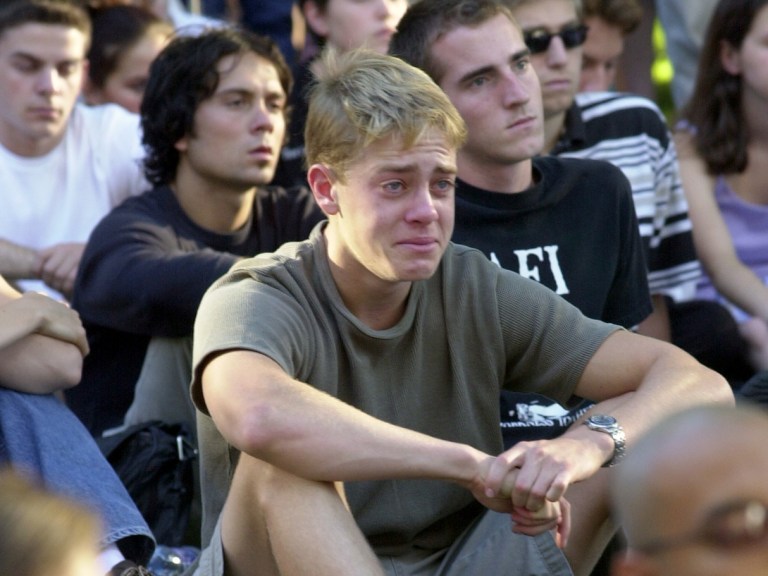
Participants in a vigil outside of Memorial Church in Harvard Yard.
Grief and shock
“We come together, united by a sense of shock, of sadness, of outrage,” said President Lawrence H. Summers to a crowd of approximately 5,000. “When comprehension fails, we must turn to each other, turn to prayer, turn to faith. We as a university community have a special obligation to try to make sense of events like these that occurred today. Let us commit ourselves to seeking that understanding as a community.”
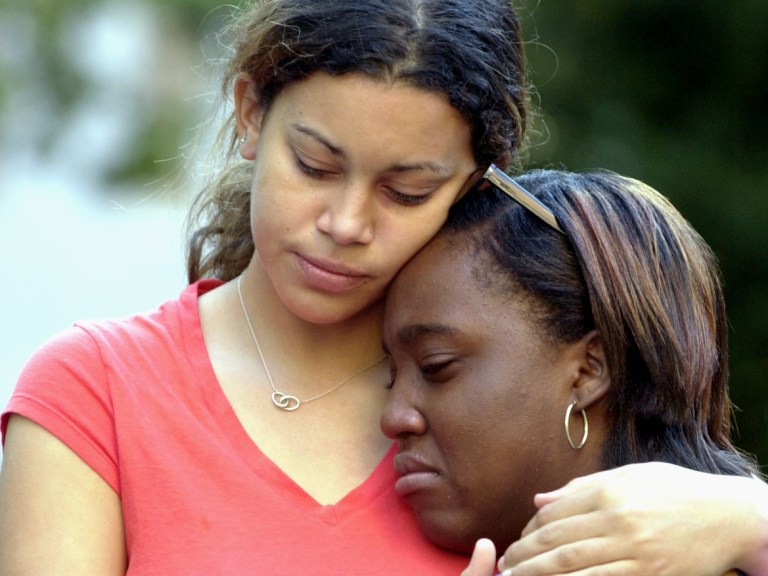
Johanna Paretzky (left) and Kamala Salmon find comfort in community during a moment of silence at Tuesday’s Harvard Yard vigil.
Solace through community
As the horrendous images of devastation at New York’s World Trade Center and destruction at the Pentagon blanketed the airwaves Tuesday, Harvard absorbed the awful news, shook off the shock, and got to work.
It was anything but business as usual, however. At Harvard, as at many universities and businesses across the country, normal functioning ground to a halt. Some classes were canceled and some offices closed, but others kicked into high gear.
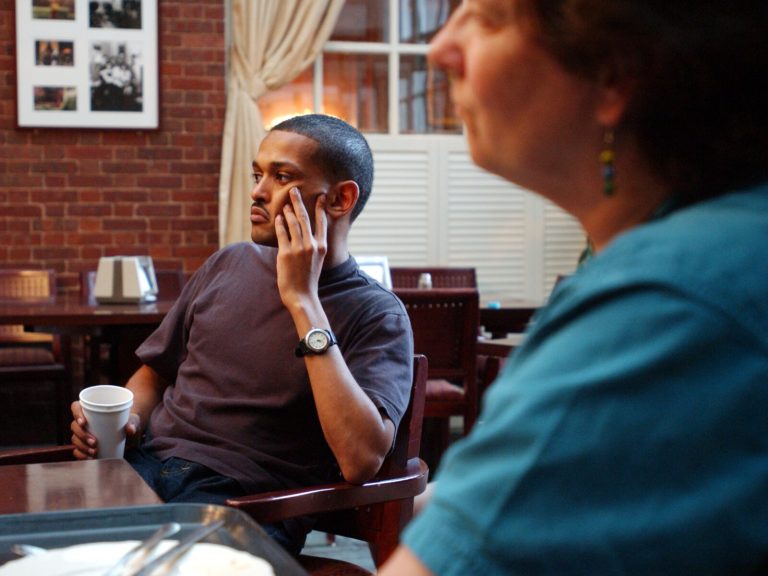
Dagmawi Woubshet and Victoria Macy join the discussion between Harvard students and faculty gathered at the Adams House Conservatory to discuss Islam, the myths that are being propagated, and ways to become involved in and support the Muslim and Arab communities.
Harvard’s Muslim community
When Saif Shah Mohammed came to Harvard as a first-year three years ago, it was the first time he had been in the United States. A native of Bangladesh who grew up in Kuwait, now a senior concentrating in economics, Shah Mohammed says that living in America has affected him profoundly.
“I’ve come to love America in the last three years,” he said. “I’ve come to love the people, I’ve come to identify with this place. When people here grieve, I grieve.”
But on Sept. 11, when terrorists attacked the World Trade Center and the Pentagon, Shah Mohammed found himself in a difficult position.
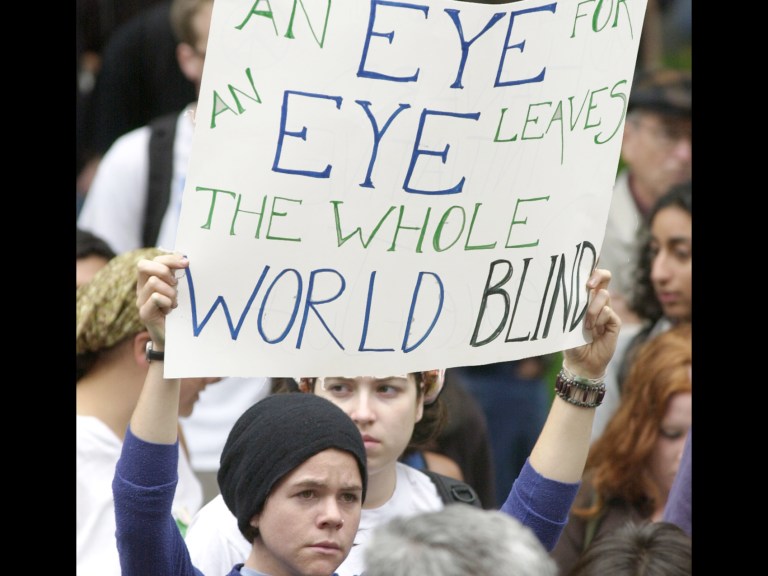
During the rally, Molly McOwen, holds aloft a sign warning against retaliation for the recent terrorist attacks.
Rally for peace
“What do we want? Peace! When do we want it? Now!”
The familiar chant began halfway through a rally of 300 or so in front of Widener Library at noon, Sept. 20.
Brian Palmer, lecturer in the Study of Religion, spoke of the innocent lives that may be lost if America goes to war and asked for “a moment of silent mourning for those who have been murdered and those whose continuing breath is in our hands.”
Voices from the fallout
Personal stories of September 11 and its aftermath.
Those we lost
Eleven members of the Harvard community died in the attacks.
David Alger
A member of the Harvard College Class of 1966 and manager of Fred Alger Management, Inc., he died at the World Trade Center.
Paul Ambrose
A physician and 2000 graduate of the School of Public Health, he was aboard American Airlines Flight 77, which was crashed into the Pentagon.
Mark Bavis
A former Harvard hockey assistant coach, he was aboard United Airlines Flight 175, which was crashed into the south tower.
Anthony Demas
A student of the Harvard Business School and managing director of Aon Corp., he died at the World Trade Center.
Steven Lawrence Glick
A 1989 Harvard Business School graduate and a managing director with Credit Suisse First Boston, he died at the World Trade Center.
Edward R. Hennessy Jr.
A member of the Harvard College Class of 1988 and a consultant for Emergence Consulting, he was aboard American Airlines Flight 11, which was crashed into the north tower.
Waleed Joseph Iskandar
A 1993 Harvard Business School graduate and a business strategy consultant at the Monitor Group in Cambridge, he died on Flight 11.
Andrew Keith Kates
A 1991 Harvard Business School graduate and a chief administrative officer at Cantor Fitzgerald, he died at the World Trade Center.
Michael B. Packer
A member of the Harvard College Class of 1976 and a managing director at Merrill Lynch, he died at the World Trade Center.
Meta Waller
A 1982 Kennedy School of Government graduate, and a special programs manager for the administrative assistant to the secretary of the Army, he died when Flight 77 was crashed into the Pentagon.
Steven Weinstein
A 1973 Graduate School of Arts and Sciences graduate, he died at the World Trade Center.
Donald A. Peterson
A participant in the Owner/President Management Program and long-time president of the Continental Electric Company, he died when Flight 77 was crashed into the Pentagon.
Twenty years after
Hard lessons from 9/11
Harvard professors detail how it reshaped homeland security, foreign policy, the study and treatment of PTSD, and crisis planning and management.
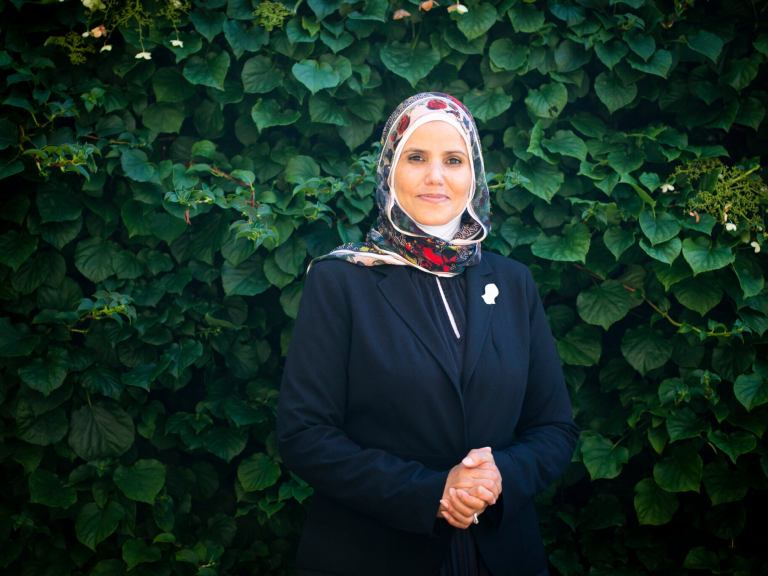
Born to take on Islamophobia
“After Sept. 11, everything around you made you feel that you didn’t belong here,” said Samia Omar, Harvard’s first Muslim woman chaplain.
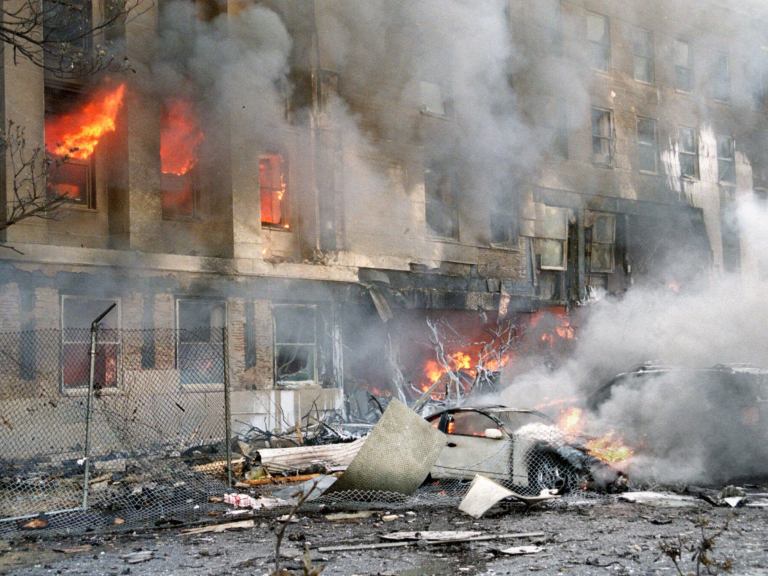
Where were you when it happened?
Faculty and staff from across the University reflect on the day and the aftermath.

‘We were very grateful just to see all of us back here alive.’
Former students recall the confusion and fear of 9/11, the desire to do something, and the sense that everything would be different now.